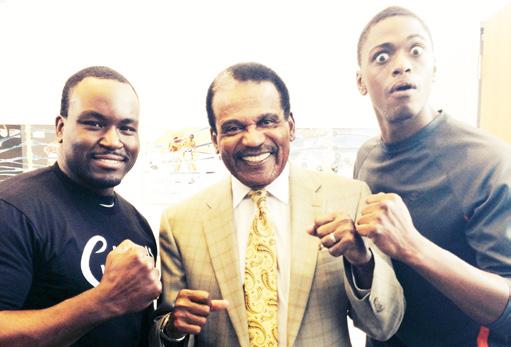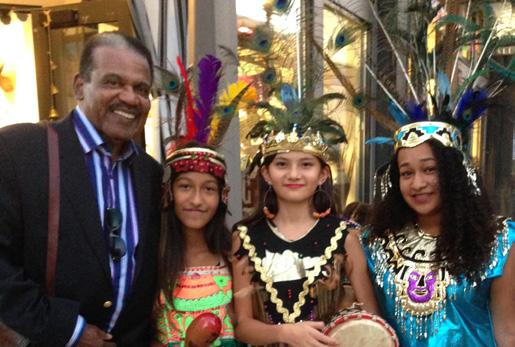
5 minute read
Ken Clay: Awards In Arts Lifetime Achievement Awards Recipient
by G. Douglas Dreisbach
Ken Clay is the recipient of this year’s Fund for the Arts Awards in the Arts Lifetime Achievement Award, and no one is more deserving. He has been a longtime supporter of the Greater Louisville arts and culture community. In the 1960s, he opened the Corner of Jazz, the first African-American culture shop in Louisville. In 1978, he co-founded the Renaissance Development Corp., which was a cultural arts administrative organization that promoted Black art and culture in Kentucky. He’s also an entertainment coordinator for WorldFest, and the list goes on and on.
Advertisement
Audience publisher, G. Douglas Dreisbach, caught up with Clay and talked about his Louisville roots, his passion for the arts and more.
This is an excerpt of the full interview. To read it in its entirety, visit Audience502.com.
G. Douglas Dreisbach: Congratulations on the award. After all of the time and effort that you’ve put into some very important causes around the community over the years, what does it mean to you to be recognized with this kind of an honor?
Ken Clay: I rank it extremely high in the kinds of awards I have received over my lifetime, and it will always hold a special place in my heart. I see it as a recognition of my contributions to the Louisville community and to the arts, and I’m seeing those separately because my past has been involved very much with the community, particularly the African-American community. So, my focus on the arts has always been community-driven, and I think that’s the kind of recognition this special award gives to me.
GDD: When you started gaining an appreciation for the arts, was it more in the music genre, or did you also have some involvement with other aspects of the performing arts?
KC: It was mostly in music. I went to Central High School and got into the choir there, and quickly the music instructor, Nanny B. Crumes, recognized that I had a special voice. She put me in a group call Les Chanteurs, which was historically one of the top singing groups in high schools, and I ended up being one of the soloists in that group. She also put me in a couple of operas. One day, I was practicing and she brought in Moritz von Bomhard, who was with the Louisville Orchestra at the time, to criticize us on our performance and help us in that respect, and that was a very thrilling moment for me.

Ken Clay poses with actors from the opening of the play Young Ali at the Ali Center in Louisville.
GDD: Why do you think the arts and music is important to our communities and society overall?
KC: The arts have a special power, connective power. It can connect people. It can connect movements. It has that power to bring the people together. If you want to understand a culture, listen to their music and you will get a better understanding of the culture and of the people. I’m fortunate to have been presenting the WorldFest for the city of Louisville for the past 19 years. I book the groups and manage the entertainment aspect of it, and I am always impressed by the quality of performing artists and musicians who live right here in our community. To be able to bring them all together on a platform such as the WorldFest has been a delight for me. I wish more people understood how important it is to relate to other nationalities. You can do it through their art, their music, and many other ways.
GDD: Some say that the arts serve somewhat as a mirror of society and reflection of current events. What do you think we will see in the coming years that reflect on our current events?
KC: During the Civil Rights movements, music was created that walked side-by-side with the marches and demonstrations. The music of the civil rights struggle became very prominent. Today, the protest art you see with the Black Lives Matter activities is just another example of how arts and movements go hand in hand. I don’t think there could be one without the other because art is the expression of a feeling, the expression of a reason, and the expression of a cause, and they connect with one another as they progress.
GDD: When you first became active in the ’60s and ’70s with the different initiatives, were there any specific colleagues or role models who helped you achieve your vision?
KC: I co-founded the Renaissance Development Corp. with a guy named Clayton Duhane, who was from New York, but had moved to Louisville. He and I got together to create this organization that provided technical administrative assistance to Black artists. We worked with the singers. We worked with theater groups. We did art exhibits for visual artists. We also conducted the first minority survey focusing on minority artists in Kentucky. We went across the state and put together a directory, and then held the first conference of minority artists ever held in Louisville. So, he, indeed, was one person that was really creative, working with me throughout that period.
GDD: What do you think the future of live performances looks like, and when do you think we will see some return to it?
KC: I have no idea, but it is really going to be a challenge. I think we live in a technically sound world, so we must do the things virtually. We have to use video. But we must make sure we continue somehow to connect the work of art with the audiences that we are here to serve, the communities that we are here to serve.

Ken poses with Eastern Indian Dancers at WorldFest 2018. He books the entertainment for this annual celebration.
GDD: Fund for the Arts is a special organization to this community. They have stepped up to help various arts-related nonprofits with leadership, funding and direction overall. In your vision, what else could be done to ensure the arts stay vibrant for years to come?
KC: Well, art is always in need of support, especially financial support. I would also like to see more emphasis on presenting the arts of our multicultural communities. I don’t think we have enough of that here in our city, and I think we need to grow that. But I have been so impressed with what I’ve seen over the years, and right here in Louisville, too, in terms of the talents and the artistic offerings that we could definitely present, and I hope we focus more on that.



